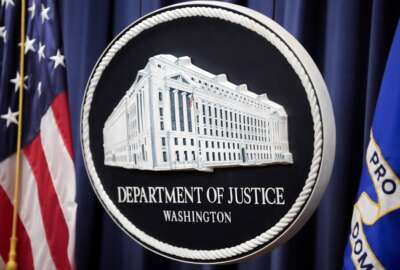The Marshals Service has trouble managing detention
The Government Accountability Office has found the Marshals Service needs to improve its oversight of incarceration facilities.
The Bureau of Prisons may operate federal incarceration facilities, but the Marshals Service also detains people — nearly 60,000 every day. So, it has to partner with jail operators, both governmental and private. The Government Accountability Office has found the Marshals Service needs to improve its oversight of these facilities. The Federal Drive with Tom Temin got more from the GAO’s acting director of homeland security and justice issues, Derrick Collins.
Interview transcript:
Tom Temin Let’s begin with the beginning. Marshals Service you don’t think of as a detention and incarceration agency. So, tell us the scenario that results in this for them.
Derrick Collins The Marshals Service is responsible for ensuring the safe and humane housing of the nearly 60,000 individuals in federal custody who are awaiting trial or sentencing on any given day. Now, the Marshals Service does not own or operate jails. But as you mentioned, it partners with private facilities, state and local governments as well as DOP, to house these individuals. And, so, we were asked by Congress to review Marshals Service oversight of the private and state and local facilities it uses to house the individuals.
Tom Temin So, these are people headed to prison, anyway, for the most part, but they’re not there yet.
Derrick Collins Potentially.
Tom Temin Got it.
Derrick Collins They’ve not been convicted.
Tom Temin Right. Some people, I mean, there’s a state of being convicted, but they let you settle your affairs externally for a month or something before you report. If you’re not violent, I think.
Derrick Collins Sure. People have been sentenced to that period before you actually go to the facility.
Tom Temin Or go to, you know, Northern Siberia, whatever the case may be. So, what were you looking for in this particular report, then?
Derrick Collins So, Tom, our objectives were to assess the extent to which the Marshals Service had implemented mechanisms to identify and address concerns related to detention conditions for individuals in its custody, and then see the extent to which it has incorporated key steps to assess the performance of its detention operations.
Tom Temin And it looks like you and some of your folks spent time watching the Marshals Service do the oversight in several locations.
Derrick Collins As part of our review, we conducted observations of facility reviews and interviewed officials at seven detention facilities in five Marshals districts across the country.
Tom Temin Wouldn’t that, though, invoke, is it the Heisenberg principle? Where the observation of a phenomenon changes the phenomenon? That is, how could you get an objective look at their oversight if they know you’re sitting there watching their oversight?
Derrick Collins Marshals still had to go through the normal steps that they would take in conducting their reviews of the facilities. And, so, we’re essentially flies on the wall, watching them use the tools that are in place for them to conduct these assessments.
Tom Temin And where do they take place?
Derrick Collins The assessments take place in the facilities themselves. And, so, what the deputies do is they’ve got their tools or checklists that are aligned with federal detention standards. And, you know, their review should include firsthand observations, reviews, facility records as appropriate, as well as interviews with facility staff, and individuals in custody, as appropriate.
Tom Temin And you looked at six specific places, though, correct?
Derrick Collins Correct.
Tom Temin And they were where?
Derrick Collins They were in Alabama, Illinois, Georgia, Texas, as well as Wisconsin.
Tom Temin All right. And were they examining, Marshals Service examining federal facilities or state operated or privately owned but operated under federal or state supervision?
Derrick Collins So, we reviewed one private facility or actually saw the review of one private facility as well as five local facilities.
Tom Temin And what did you generally find? What are the overall, what’s the top line finding? We’re speaking with Derrick Collins. He’s acting director of homeland security and justice issues at the Government Accountability Office. And were actual issues or problems uncovered with respect to the conditions of the prisons or the way prisoners or detainees were treated?
Derrick Collins Overall, we found that the Marshals Service has room for improvement in conducting its oversight. In particular, we noted that the deputies who are responsible for conducting the reviews didn’t always receive training. And, so, in December 2020, the Marshals Service stopped training the deputies on their online platform due to technical and security concerns. The Marshals Service has told us that they plan to complete a new training and have it ready to go in 2024, but they do not have a plan and timeframes in place for ensuring that all the deputies receive the training. In addition, we found that the deputies also didn’t have guidance on how to use the tool. So, there are instances in which we thought or saw that the deputy didn’t review documentation, or perhaps ask individuals in custody of their perspectives on their conditions. What we found in looking at Marshals Service data is that most of the or all of the private facilities met minimum detention standards, but not all state and local facilities met federal detention standards. And, so, we saw that about 65% of state and local detention facilities had not obtained the Prison Rape Elimination Act audit within the past three years. There were about 24% of the state local facilities that had not insured testing for tuberculosis during the initial intake period. And about 10% of state and local detention facilities have not been inspected within the past couple of months to ensure that their food service and equipment met established health and safety standards.
Tom Temin So, there could be some problems with then the prisoner actual treatment person federal standards?
Derrick Collins Their condition and care, correct.
Tom Temin And, so, what were your recommendations, then? It sounds like they are mostly in the training and sticking to the standards that exist area.
Derrick Collins Yeah. So, Tom, we overall had eight recommendations to help the Marshals Service improve its oversight, including developing guidance, as well as the planning timeframe to help deputies with the training and routinely analyzing available detention operations data so that they can identify trends and potential problem areas, and then establishing performance goals for the conditions at the local detention facilities.
Tom Temin And by the way, who in the Marshals Service does this? Are there people dedicated to oversight of detention? And does the Marshals Service, do you feel, have the capacity to give those people the annual training they need? Since it seems like it was sort of vestigial, leftover from the pandemic era.
Derrick Collins They do have a prisoners operation division. You know, one of the key things that we note in the report is that the deputies that are involved in conducting interviews do this as a collateral duty. That’s why it’s so important that they receive the training on an annual basis as well as have guidance for understanding how to use the tools. We believe so. As I’ve mentioned, the Marshals Service is in the process of finalizing the new online platform and training and they do have a requirement that all the deputies take the training each year. And so we’ll be, as we always do, following up on our recommendations with the agency to check on the implementation status and provide guidance as needed.
Tom Temin And the agency generally concurred, in this case.
Derrick Collins To the Marshals Service’s credit, they did concur with our findings and recommendations and recognized the need to address some of the deficiencies that we identified in our work.
Eric White Derrick Collins is acting director of homeland security and justice issues at the Government Accountability Office.
Copyright © 2024 Federal News Network. All rights reserved. This website is not intended for users located within the European Economic Area.
Tom Temin is host of the Federal Drive and has been providing insight on federal technology and management issues for more than 30 years.
Follow @tteminWFED






